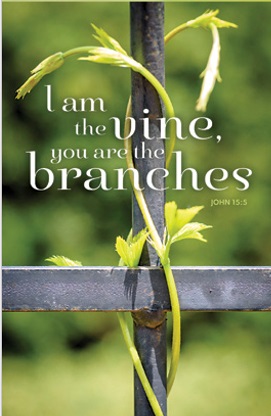Connected for Life
 Saturday, April 27, 2024 at 11:59AM
Saturday, April 27, 2024 at 11:59AM 
from Sundays and Seasons

 Saturday, April 27, 2024 at 11:59AM
Saturday, April 27, 2024 at 11:59AM 
from Sundays and Seasons
 Friday, April 5, 2024 at 4:19PM
Friday, April 5, 2024 at 4:19PM Jesus breathes on his disciples (John 20:22), beginning the respiratory cycle with this exhalation. The disciples presumably complete it, inhaling the breath that Jesus has exhaled.
Morgan Harper Nichols, in her book Peace is a Practice, describes both the inhale and the exhale: “Inhaling is the act of taking it all in. It’s making room for inspiration. . . . To exhale is to say: I’ve done the work I can do. I’ve taken in what I can take in. Now is the time to release. Let it go.” (Morgan Harper Nichols, Peace Is a Practice, Grand Rapids, MI: Zondervan, 2022, pp 14-18).
Jesus has done his work. Now he releases the work of forgiveness to his disciples. He sends them, just as the Father sent him (20:21).
from Sundays & Seasons
 Friday, April 5, 2024 at 1:17PM
Friday, April 5, 2024 at 1:17PM Jesus’ resurrection confronts the sadness and loneliness of Thomas’s doubt. Many people in congregations left Easter Sunday’s celebration of the resurrection with feelings similar to those of Thomas. Somehow, Thomas was not in the right place at the right time to see Jesus show up in the flesh. No doubt, people in the pews can relate to Thomas’s missed opportunity. Perhaps they were unable to attend a family Easter gathering. Maybe a bunch of friends had box seats to the hottest game in town, and they were not able to afford one. Maybe a chemo treatment interrupted an opportunity for career advancement. Human beings are endlessly plagued with feelings of not fully belonging to the group, and they desire a saviour to use magical power to restore perfection.
Time and again, the disciples seek a messiah who overwhelms them and the world with crushing military might and magical cures. Today, the power of the resurrection is most realized in the real, deep wounds of Jesus’ own body. Without those wounds and the real sacrifice that God made on the cross, Thomas’s faith would always be hobbled by his overwhelming doubt. Yet people still ask: how can God’s reality of overflowing love and life confront and transform our parched world and wounded bodies?
Jesus makes faith happen today by breathing the Holy Spirit upon the disciples and blessing them with peace. He shows Thomas and all God’s people that the life-changing resurrection embraces the wounds all people carry. God the Creator’s peace, Jesus’ wounds, and the breath of the Holy Spirit lead Thomas to believe that Jesus was raised from the dead. Then, Thomas trusts God to care for his body and his life. Just like Jesus’ ministry prior to the cross, Jesus reaches for the outsider and restores Thomas to his place in the community.
from Sundays & Seasons
 Saturday, June 10, 2023 at 11:59AM
Saturday, June 10, 2023 at 11:59AM Following Matthew’s call in Matthew 9, "Follow me", a group of religious folks express their disdain for Jesus’ inclusive table practices. He dines with “tax collectors and sinners,” expanding his circle of welcome far beyond the bounds of what was culturally expected or acceptable.
This moment presents an opportunity for us to think about our own practices of hospitality. Are our dinner guests primarily those who look and think just like we do? Do our social gatherings mirror the broad and inclusive welcome of Jesus?
What would radical hospitality look like for us?
 Sunday, May 28, 2023 at 4:13PM
Sunday, May 28, 2023 at 4:13PM It is the “first day of the week” (John 20:19), the day of the new creation, but to those locked away in the upper room in fear, the world is as it always has been. So entrenched are they in the ways of grief and guilt that the Risen One in their midst needs to offer his life-giving invitation twice: “Peace be with you.” The logic of the new age is peace, not retribution; forgiveness, not vengeance. With the invitation to new life comes also the means: the gift of the Holy Spirit, breathed upon them and within them. Just as the Father sent Jesus into the world, so now are these disciples sent as witnesses to God’s saving work.
Pentecost is therefore the crowning achievement of the Jesus story. Now, more than ever, these huddled disciples would have just cause to sing the “Dayenu” (“It would have been enough”) verses from the Passover seder meal, but revised: It would have been enough for the Word and wisdom of God to have been born in the flesh . . . Dayenu! It would have been enough for the Word to grow to adulthood and share his stunning parables about God’s gracious activity in the world . . . Dayenu! It would have been enough for this Word to say to his enemies, “Father, forgive them” . . . Dayenu! It would have been enough for this Word to have died on a cross for us . . . Dayenu! It would have been enough that he rose again in blessing, not vengeance . . . Dayenu! But now, beyond what we would even expect—the Word becomes our word and it is written on our hearts at Pentecost . . . Dayenu! It is enough, and more than enough to enflame our ministry of reconciliation in a world in need of a healing word.
from Sundays & Seasons
| About us | Looking for a faith community? | Meet our Pastor and staff |
| Contact us | Directions | Media Releases |